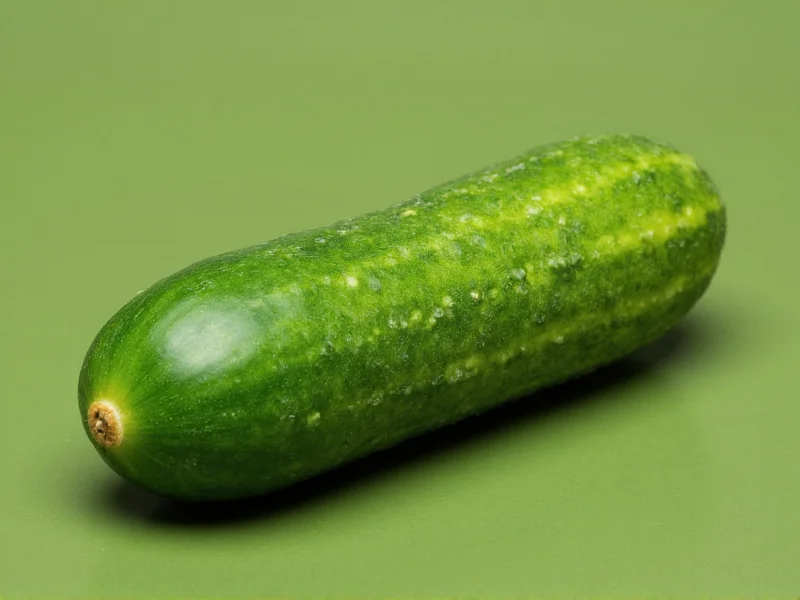Understanding the relationship between pickles and cucumbers requires examining both the botanical classification of cucumbers and the culinary process of pickling. This distinction addresses the common confusion behind the question is a pickle a cucumber and clarifies a fundamental food science concept many people misunderstand.
What Exactly Is a Cucumber?
Cucumbers (Cucumis sativus) belong to the Cucurbitaceae plant family, which also includes squash, melons, and pumpkins. These crisp, refreshing vegetables consist of approximately 95% water and grow on climbing or trailing vines. Commercially, pickling cucumbers differ slightly from slicing cucumbers—they're typically shorter, have thinner skins, and contain fewer seeds, making them ideal for preservation.
The Pickling Process: Transformation Explained
Pickling represents a food preservation method that transforms fresh cucumbers into what we commonly call pickles. This process occurs through two primary methods:
| Pickling Method | Process Duration | Key Characteristics |
|---|---|---|
| Vinegar Pickling | Hours to days | Quick process using vinegar solution, no fermentation, crisp texture |
| Fermentation Pickling | Days to weeks | Natural lacto-fermentation, develops probiotics, complex flavor profile |
During vinegar pickling, cucumbers submerge in a solution of vinegar, water, salt, and spices. The acidic environment preserves the vegetable while altering its texture and flavor. Fermentation pickling relies on saltwater brine, where naturally occurring bacteria convert cucumber sugars into lactic acid, creating preservation through acidification.
Common Misconceptions About Pickles and Cucumbers
Several misunderstandings fuel the question is a pickle a cucumber. The most prevalent misconception suggests pickles represent a separate vegetable species rather than a processed form of cucumber. In reality, the term "pickle" refers specifically to the preservation method, not the vegetable itself.
Another frequent confusion involves the assumption that all pickled items are cucumbers. While traditional pickles are made from cucumbers, numerous other vegetables undergo pickling, including:
- Beets (creating pickled beets)
- Carrots (common in Asian cuisine)
- Onions (popular as burger toppings)
- Peppers (like banana peppers)
- Cauliflower (frequently included in mixed pickle trays)
Nutritional Differences Between Cucumbers and Pickles
The pickling process significantly alters the nutritional profile of cucumbers. While fresh cucumbers contain minimal sodium, pickles—especially vinegar-pickled varieties—often have substantially higher sodium content due to the preservation process. Fermented pickles develop probiotics beneficial for gut health, which fresh cucumbers lack.
Understanding the difference between pickles and cucumbers nutritionally helps consumers make informed dietary choices, particularly those monitoring sodium intake or seeking probiotic benefits.
Historical Context of Pickling
Pickling represents one of humanity's oldest food preservation techniques, dating back approximately 4,000 years to ancient Mesopotamia. Historical records indicate cucumbers were first cultivated in India around 2000 BCE and later introduced to other regions where pickling became essential for food preservation before refrigeration.
The word "pickle" derives from the Dutch "pekel" or northern German "pókel," meaning salt or brine, highlighting the fundamental preservation method. This historical perspective clarifies how pickles are made from cucumbers and why the distinction matters in culinary traditions worldwide.
Botanical vs. Culinary Classification
From a botanical perspective, cucumbers qualify as fruits because they develop from the flower of the cucumber plant and contain seeds. However, culinarily, both fresh cucumbers and pickles are treated as vegetables due to their savory flavor profile and typical usage in dishes.
This dual classification system explains why many people become confused when considering what makes a cucumber a pickle—the transformation involves culinary processing rather than botanical change.
Modern Pickling Variations
Contemporary food science has expanded traditional pickling methods, creating numerous pickle varieties that address the question are all pickles made from cucumbers. While cucumbers remain the most common base, innovative preservation techniques now apply to virtually any vegetable.
Refrigerator pickles have gained popularity for home preparation, offering a simplified vinegar-based method requiring no canning equipment. These quick pickles maintain more of the original vegetable's crispness while delivering the characteristic tangy flavor associated with traditional pickling.











 浙公网安备
33010002000092号
浙公网安备
33010002000092号 浙B2-20120091-4
浙B2-20120091-4